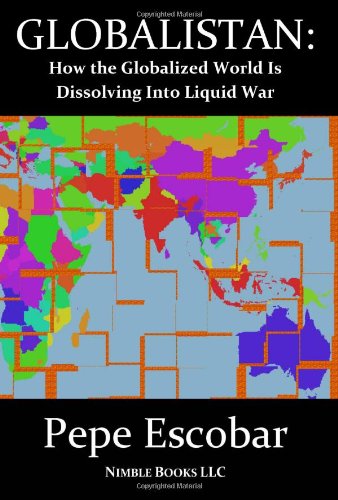The gravity around the newly-enlarged BRICS constellation is drawing in Arab, Muslim, and Global South adherents to the influential group’s message on international law, Palestine, and halting forever wars.
MOSCOW – Something of extraordinary magnitude happened in Moscow on 23 May. Bahrain’s King Hamad bin Isa Al Khalifa personally asked Russian President Vladimir Putin to help organize a peace conference on Palestine, at which Russia would be the first non-Arab nation invited.
Al-Khalifa and Putin had two rounds of discussions – one of them closed – during which the main focus was always Palestine. The Bahraini monarch noted that in a rare show of unity, the Arab world had finally come together in agreement to end the war in Gaza. It was implied that Russia was subsequently chosen as the most reliable mediator to end the brutal conflict.
Bahrain – and the Arab League – recognize that the Russian position centers around what Putin had previously defined as the “UN formula”: an independent Palestinian state with its capital in East Jerusalem.
That happens to be the position of the BRICS-10 nations and virtually the whole Global Majority. Crucially, it is also the common position of China and the Arab world, reaffirmed in Beijing only one week after the Russia-Bahrain meeting.
The problem is how to implement the “formula” when the US hegemon, Israel’s unconditional ally, has a virtual stranglehold on the United Nations.
By 2020, as Tel Aviv was openly announcing the inevitable annexation of the West Bank, the Abraham Accords were smashing a major Arab taboo on openly supporting Israel, via the normalization agreements signed in Washington DC by Bahrain, the UAE, Morocco, and Sudan.
Nine months ago, Palestine was virtually isolated, and destined to extinction via quiet Israeli policies to incrementally force expulsion. But never underestimate the power of a genocide committed in broad daylight, on video. Today, the Russia-China strategic partnership, BRICS, and the Global Majority have been mobilized to enshrine Palestine as a sovereign state – faithful to the recent super-majority UN General Assembly vote to accept Palestine as a UN member.
It will be a long, winding, and thorny road that has the potential to split the world in two.
Lavrov lays it all out
The St. Petersburg forum last week offered three crucial messages to the Global Majority, focused around BRICS. The crux of the sessions may have been geoeconomics, but a now-unavoidable message of support to Palestine crept into the sidelines.
After a panel ostensibly debating the supply and demand of oil and gas, and which touched upon the principled role of Yemen in the Red Sea directed against the Gaza genocide, support for Palestine, amidst friendly smiles (but off the record), was emphatic from everyone – from OPEC secretary-general Haitham al-Ghais to the UAE’s Minister of Energy Suhail Mohamed al-Mazrouei.
Same on a Russia-Oman panel, coming from Minister of Commerce Qais bin Mohammed bin Moosa al-Yousef.
Earlier this week, the Palestine tragedy was addressed in detail – on points 34 and 35 – in the joint statement of the BRICS 10 Ministers of Foreign Affairs, who sat at the same table for the first time in Nizhny Novgorod, preparing for the extremely important annual BRICS summit next October in Kazan, under the Russian presidency. Three very important points were made there:
First, the Ministers “reaffirmed their rejection of any attempt aiming at forcefully displacing, expelling or transferring the Palestinian people from their land.” Second, they collectively “expressed serious concern at Israel’s continued blatant disregard of international law, the UN Charter, UN resolutions and Court orders.” And third, the ten foreign ministers:
“Reaffirmed their support for Palestine’s full membership in the United Nations and reiterated their unwavering commitment to the vision of the two-state solution based on international law including relevant UNSC and UNGA resolutions and the Arab Peace Initiative that includes the establishment of a sovereign, independent and viable State of Palestine in line with internationally recognized borders of June 1967 with East Jerusalem as its capital living side by side in peace and security with Israel.”
This is BRICS speaking with one voice – including, crucially, representatives of major Muslim-majority states: Iran, Saudi Arabia, the UAE. and Egypt.
Then Russian Foreign Minister Sergey Lavrov, at an expanded BRICS session defined as BRICS+/BRICS Outreach, offered extra, important, context.
“We held an intra-Palestinian meeting in Moscow. We did this repeatedly. The last time it was held in late February and early March of this year, all Palestinian factions, including Hamas and Fatah, were present. For the first time, an event of this kind ended with the adoption of a joint statement in which everyone, including Hamas, expressed their readiness to unite the Palestinian ranks on the basis of the platform of the Palestine Liberation Organization. Previously, it was not possible to achieve this.”
Lavrov explained why, for Russia, it is essential to restore Palestinian unity:
“Only a united Palestine can be a partner in negotiations aimed at achieving the maximum desired outcome. As long as the Palestinians are divided, this is unlikely to work. Now, without any Palestinians, they are beginning to think about what to do with the Gaza Strip next: either to establish some kind of protectorate of Arab countries, or to introduce some kind of peacekeeping force, or to artificially declare that these will be territories governed by the Palestinian National Authority. These are all initiatives that are imposed by external players.”
And that brings us to the kernel of the Russian position: “The most important component of our long-term policy in this area will be to support the movement for the creation of a Palestinian state in full compliance with UN resolutions.”
How to respond “symmetrically”
All of the above sums up the carefully calibrated, official Russian position. Moscow abhors Israel’s non-stop, irrational escalation while ceasefire proposals are on hand galore. At the same time, it won’t take sides – either with Hamas or with Yemen’s Ansarallah. It is a consensus diplomats and Russia analysts routinely express: Russia will not get into a war thousands of kilometers away when it is fighting a US/NATO existential threat right at its western border.
After Putin’s answers in the Q&A following his address to the plenary session in St. Petersburg, debate raged on what sort of “symmetrical” responses Russia’s ministry of defense would come up with to counterpunch NATO’s green light for strikes with long-range missiles inside the Russian Federation.
West Asia, predictably, features in the favorite scenario: advanced strike weapons deployed in Syria, described as “Syrian weapons” to mirror the west’s “Ukrainian weapons” subterfuge. These would supplement arms already deployed at Russia’s Khmeimim and Tartus bases – covering the Eastern Mediterranean, Lebanon, Israel, and US bases in Jordan, occupied Syria and occupied Iraq – and would be operated by Russian personnel, much as US/NATO personnel operate “Ukrainian” weapons.
A BRICS thorn
Now we come to the thorn in the BRICS flower arrangement – Saudi Arabia.
A discombobulated White House and US Deep State seem to have found a formula to wean Riyadh away from its new role as strong BRICS player: a landmark defense treaty, dubbed the Strategic Alliance Agreement, in the wings awaiting Riyadh’s formalization of relations with Tel Aviv.
The Strategic Alliance Agreement would need to get a two-thirds majority vote in the US Senate. Yet insistence on “normalization with Israel” may well kill the deal, as Saudi Crown Prince Mohammad bin Salman (MbS) now has options to carefully consider, not only regarding the Gaza tragedy, but over his new BRICS alliances.
Riyadh’s official position on Palestine is tied up with BRICS; end of the war/genocide in Gaza, and the establishment of a Palestinian state. And every grain of sand in the lands of Islam is fully aware that a Tel Aviv ruled by an ethnocentric mob of extremists won’t accept a two-state solution.
Moreover, a Saudi-US military alliance is totally incompatible with Riyadh becoming an influential member of BRICS. Chessboard moves are instead pointing to sooner or later a possible Global Majority military alliance to counterpunch the escalating US/NATO war – Hybrid and otherwise – against the dawning of a multinodal, polycentric, and in Putin’s terminology in St. Peterburg, “harmonic” multipolar world.
Add to it the expiration earlier this week of the US-Saudi agreement signed 50 years ago to establish the petrodollar, essentially in exchange for US military protection.
Already last year Riyadh made it clear the agreement would not be renewed when it clinched a deal with China based on energy trade using the petroyuan.
So in theory we are advancing further on down the road towards the demise of the petrodollar, coupled with the expansion of the digital yuan. The Central Bank of Saudi Arabia is now a “full participant” of Project mBridge, which unites the BIS Innovation Hub, the Central Bank of Thailand, the Central Bank of the UAE, the People’s Bank of China, and the Hong Kong Monetary Authority.
Essentially, mBridge is a multi-Central Bank digital currency (CBDC) platform shared among Central Banks and commercial banks, and enabling instant cross-border payments and settlement. Thailand, for instance, is buying oil from the UAE using mBridge.
There are no less than 26 mBridge observers – quite a mixed bag, including the China-led Asia Infrastructure Investment Bank (AIIB), the European Central Bank, the IMF, and the World Bank.
As Saudi Arabia joins mBridge, Saudi Aramco – after opening itself to foreign investors with a huge IPO – has just ceded an extra 0.64 percent of its capital, with 60 percent of the buyers American. Aramco is a humongous fountain of dividends for shareholders: this year, that will amount to a whopping $141 billion.
Guess who are the top new investors? The Big Three – Vanguard, BlackRock, and State Street – now all wallowing in Saudi oil.
Arabs, CENTCOM, and Israel: in bed together?
And now for the ultimate complicating factor.
On Monday, military officers from Bahrain, Egypt, Saudi Arabia, the UAE, and Jordan – which includes three BRICS members and Russia-friendly Bahrain – met with Herzi Halevi, the IDF’s Chief of General Staff to discuss…defense cooperation.
The meeting was facilitated by none other than the US CENTCOM. Although as low-profile as it gets, the meeting still leaked, given the juxtaposition of the Gaza genocide alongside a meeting of top Arab leaders sitting with the Arab world’s worst enemies.
A post-modern epigone of the cynics dwelling in the Agora in Ancient Greece would remark that with CENTCOM Arab “friends” like these – three of them BRICS members – Palestine does not need enemies.
Meanwhile, the tragedy persists on so many levels. As Chinese high school students all across the civilization-state show their support for Palestine after taking their university entrance exams, the US-Israel axis homogenizes terrorism, linked to the debacle of Project Ukraine, coupled with the non-stop killing of Palestinians.
Everything is being sucked into the black hole of terrorism – complete with NATO now openly re-arming the neonazi Azov Battalion, and Kiev targeting civilians in Belgorod with drones and scattering mines in parks where kids play.
All the components of the Hegemon-fed Terror Foreign Legion are coming together, in lockstep with Israel, which is essentially ISIS with nuclear weapons. But for all their lofty ideals and sacred belief in the UN, the BRICS still have not come up with a solid, practical strategy to fight the horror.
The views expressed in this article do not necessarily reflect those of The Cradle.
Filed under: "Israel", Bahrain, BRICS alliance, China, Egypt, Jordan, Palestine, Russia, Saudi Arabia, United Arab Emirates UAE, Vladimir Putin | Tagged: 2 states illusion, Abraham Accords, Anglozionist Genocidal War on Gaza, Arab regimes, Aramco, BRICS alliance, De-Dollarization Bombshell, Israeli Occupation Force IOF, Mohammed Bin Salman (MBS), Nazi Ukrainian "Azov battalion", Pepe Escobar, Petrodollar, Petroyuan, The US Central Command (Centcom), Yemeni Ansarullah | Leave a comment »



































